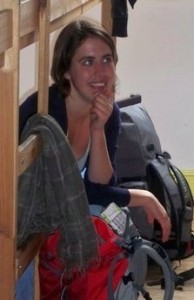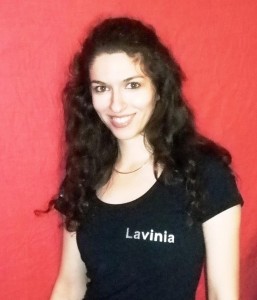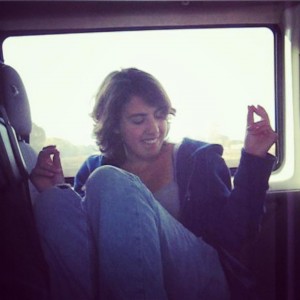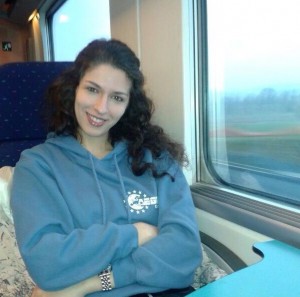As the EBM Lublin 2014 is getting closer, more details are coming out about the workshops and different topics that will be tackled. The AEGEEan has interviewed the two Content Managers from the EBM, Lavinia Manea (AEGEE-Bucuresti) and Marije Arentze (AEGEE-Leiden) about their plans and expectations for this event.
Lavinia and Marije have been working hand in hand for a little less than two months in order to bring their expertise in the field of nationalism to this event. They have been planning the topics for the panel discussions, assisting the Comité Directeur with the selection of speakers and workshop proposals, and creating a survey about AEGEE members’ perception of nationalism.
The AEGEEan: Marije, Lavinia, what made you so interested in applying as Content Managers of this EBM?
Marije Arentze: I was looking for a new challenge in AEGEE. I have wanted to become active in the thematic field of AEGEE for a long time and I was instantly enthusiastic when I read about Thomas Leszke’s (AEGEE-Köln) topic proposal, as I am dealing a lot with nationalism in my studies. But where in university the approach is mostly theoretical and the focus lies more on philosophy and intellectual history of nationalism, I am always looking for a practical angle. Being Content Manager surely gives me some practical work!
Lavinia Manea: Talking about the position of Content Manager in general, now that I have the time, I looked at my previous contribution in AEGEE and felt I could bring it to another level. As a recent Master (MA) graduate with relevant work experience, I wanted to use my knowledge and skills for a cause in which I believe. I was happy to see that the EBM has become (more) thematic and I wanted to be a part of that change. In addition, I have a special interest in the topic of nationalism and a passion for content creation. Quite obviously, this was an opportunity which I couldn’t have missed.
Which is your background in the field of nationalism, and how do you think you can complement each other?
Marije: I just started studyin European Studies and I just finished a course on national thought, which dealt with the intellectual history of nationalism, the emergence of nation-states, its different manifestations all over Europe and its related ideologies such as fascism and racism. It taught me that present-day manifestations of nationalism are the result of a cultural process that has been going on for centuries, and that the line between practicing nationalism and just expressing your national identity is very vague and thin.
Lavinia: I hold two MA degrees, both in International Relations, one with a minor in European Integration and the other in Diplomacy. As you can imagine, the issue of nationalism sprung in different forms during these years and thanks to my academic background, I am able to look at it from different points of view: historical, ethical, pragmatic etc. Apart from that, during the final conference of the Where Does Europe End (WDEE) project, I designed and facilitated sessions on the topic of nationalism throughout the duration of the event.
Why do you think there is such a strong interest in nationalism in AEGEE?
Lavinia: I believe this is owed to the high extent to which AEGEEans can relate to this issue. This is not a reality of “some” but a reality of all of us. We live in a world of nations but we are experiencing both forces pushing for a “regionalization” as for a “supranationalization” of Europe. Both of these question the relevance of the nation-state and trigger nationalist reactions on different levels. While this seems to be a very political subject, it is far more than that, given that we live and feel the consequences of these dynamics in our daily life. I believe many of us perceive these times as a crossroad, when decisions need to be made in one direction or the other and this was an additional factor which placed this topic on top of others.
Marije: In addition, nationalism is a big deal about personal identity. It’s about knowing who you are and where you belong, which becomes increasingly important for young people in a globalizing environment. The line between expressing national identity and practicing nationalism is very thin and full of shades of grey. In Lublin, with the topic on the agenda and 300+ students from all over Europe in one place, we are in the ideal environment to recognize and become familiar with all these nuances and subtleties.
The applicants of the EBM were asked about their visions of nationalism. Have you found that they have a similar concept on what nationalism is?
Marije: No, not at all. We had as many different answers as there were applicants, varying from “a sense of belonging” to “the attachment to national symbols” to “a dangerous kind of egoism”. And that is exactly what we expected, in fact it is why we asked the question. The word nationalism has a different meaning to every individual. It is a concept that is hard to define. We don’t have the illusion that as AEGEEans will reach an agreement on this, let alone during the EBM, but we wanted to inventory how AEGEEans perceive the concept.
Lavinia: Indeed. A small off-topic addition which I find important is that those questions not only for us to understand people’s vision on nationalism but also to be able to share these visions with them during the EBM. We believe that it is important to know not only what we discuss, but also with whom. The applications and the survey were a means of understanding better the state of play in AEGEE and we plan to be as transparent as possible as to the results we obtained both from the applications and the survey.
And, according to their views, do they consider it as a good or a bad thing?
Marije: The answers were 50/50, also depending on which definition they gave. Participants who perceive nationalism as “a sense of belonging” of “being proud of your country” usually described it as a positive phenomenon. People who described nationalists as “eurosceptics” or “dangerous egoists” usually described it as a negative phenomenon. None of the answers are wrong of course, but they were no less inspiring!
You have also recently launched a survey about nationalisms, with other concepts such as racism and xenophobia: how are you planning to use the results?
Lavinia: As mentioned previously, the survey as such will be presented to the whole network and will constitute a starting point of debate during the EBM. We hope to offer AEGEEans a broader perspective on the state of play in AEGEE, regarding the topic. We are –of course- aware of the limits of the survey and yet, we believe it will prove to be a very useful barometer for our network. As for why we included related concepts (racism, xenophobia, ethnocentrism etc), I will refer here to a popular saying: “a problem never comes alone”. We believe it is hard to tackle nationalism while excluding related concepts which essentially respond to a similar logic.
Can you tell us any first details about panel discussions in the EBM?

Marije: We will have two Panel Discussions, both tackling nationalism from a very different angle. The first one will be about Exploring the importance of nationalism for individual identity. We will deal with how much nationalism is intertwined with our personal identity. Questions are for example: “What is it that nationalists identify with? What is a nation? How important is national identity for individuals?”
The title of the other panel discussion is Questioning the relevance of nationalism in a changing world. In this Panel Discussion the place of nationalism will be questioned in an era in which we have “forces” asking for decentralization and forces asking for the opposite. Is “the nation” still as relevant as it was before? Will the sense of “belonging to a nation” ever fade away, or will it always be present?
Do you plan to address the topic of nationalisms in specific countries?
Marije: There will be workshops dealing with Ukraine and Belarus (by the Eastern Partnership Project), branding nationalism in America (by the PRC) and Catalonian secessionism (by Núria Fenoll Domingo and Ferran Huidobro Casamitjana from AEGEE-Tarragona). In addition, in a lot of sessions will deal with case-studies from different countries.
Lavinia: We are exploring ways in which we can create a useful learning experience for everyone. We will come with specific examples and in choosing them, we will try to be fair and careful, so that no country will be specifically targeted.
What about separatisms in the EU? In 2014 we will have the referenda in Scotland and Catalunya: do you have any ideas on that?
Marije: As said, we will have an excellent workshop from two members from AEGEE-Tarragona, which will deal with the subtleties around having an independence referendum. They will hold a simulation of the Catalonian referendum and with this they want to show how extremely difficult it is to deal with all the nuances that surround a topic as delicate as secessionism.
How are you planning to make this EBM an interactive and dynamic event?
 Lavinia: The EBM will consist of plenary sessions, panel discussions and parallel sessions, all of which will allow for interaction among the participants. We will reduce our thematic input to the minimum possible so that we leave space for debates, while still providing participants with useful information which will enable the least informed ones to take part in the discussions. Furthermore, we will avoid creating “dead” content, as I call it, that is information which doesn’t have an impact on participants. Therefore, we will not include sterile classifications and more generally, information which cannot be further assimilated and used by them. We consider the content to be a set of tools which participants will make use of, and we hope that our approach will turn as many people as possible into active contributors to the EBM.
Lavinia: The EBM will consist of plenary sessions, panel discussions and parallel sessions, all of which will allow for interaction among the participants. We will reduce our thematic input to the minimum possible so that we leave space for debates, while still providing participants with useful information which will enable the least informed ones to take part in the discussions. Furthermore, we will avoid creating “dead” content, as I call it, that is information which doesn’t have an impact on participants. Therefore, we will not include sterile classifications and more generally, information which cannot be further assimilated and used by them. We consider the content to be a set of tools which participants will make use of, and we hope that our approach will turn as many people as possible into active contributors to the EBM.
And which are your desired outcomes from this event?
Lavinia: If we should make a difference between outputs and outcomes, then our desire is for AEGEE members to become more aware of the multifaceted issue of nationalism. We also hope that increased awareness will lead to an increased capacity and desire to counter the negative aspects of nationalism. Paraphrasing an existing idea, the evil exists not only because of “the bad” minority who does harm, but also because of “the good” majority who watches passively and fails to react. In this sense, we all have a responsibility, firstly as humans and secondly as citizens of our countries.
If we should look at the output as well, there will be a follow-up document with information, conclusions and possibly recommendations. We are looking at ways in which we can involve the whole network and not only EBM participants. Following the idea that “scripta manent” we will pay close attention to the creation of outputs, both in terms of their comprehensiveness as their usefulness overall. We certainly do not want this topic to be forgotten once the EBM is over.
Marije: If you expect to learn out of this EBM how nationalistic AEGEE is and how nationalistic you are, you might have chosen the wrong conference to attend. But if you are looking for eye-openers, for a deeper understanding of the society you are a part of and of your behavior towards others, you should definitely be in Lublin!
For the ones who won’t be present at the EBM, remember that you can follow the discussions and the output from the event in the following links:
- EBM Lublin 2014 – Official: Created in cooperation between The AEGEEan, the Public Relations Committee and several other European level bodies.
- Nationalism at EBM Lublin: where the team of Content Managers are sending the latest updates on workshops and will be streaming the live discussions.
Written by Anna Gumbau, AEGEE-Barcelona



